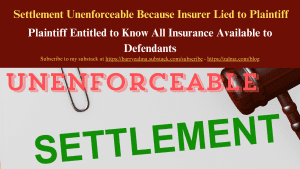Settlement Unenforceable Because Insurer Lied to Plaintiff

Post 4795
See the full video at https://rumble.com/v4tjwzw-settlement-unenforceable-because-insurer-lied-to-plaintiff.html and at https://youtu.be/1zbO_ZShhUc
Pedro Fundora filed suit against Robert Dangond and Maria Guevara after sustaining injuries when Dangond struck Fundora with a vehicle owned by Guevara. On appeal, Fundora argued that the trial court erred by granting Robert Dangond and Maria Guevara’s Motion to Enforce a Settlement Agreement.
In Pedro Fundora, etc. v. Roberto Dangond, No. 3D22-1749, Florida Court of Appeals, Third District (May 1, 2024) the plaintiffs sought to rescind a settlement agreement because the defendant’s insurer did not tell Plaintiff’s counsel about all insurance available to the Defendants.
FACTS
During litigation, Fundora sent Dangond and Guevara’s insurer, Progressive Insurance Company, a demand letter pursuant to section 627.4137(1), Florida Statutes (2011), which provides that:
an ‘insurer which does or may provide liability insurance coverage to pay all or a portion of a claim which might be made shall provide . . . a statement . . . setting forth [the information specified in this statute] with regard to each known policy of insurance ….’ (Emphasis supplied).
In response, Progressive sent Fundora a letter disclosing only one policy, held by Dangond. Included in the disclosure was a statement “certify[ing] . . . that the contents of this disclosure made pursuant to Florida Statute 627.4137 are true and correct.” Progressive did not disclose any other policies.
When Fundora later offered to settle with Dangond and Guevara, for limits based on the disclosures from Progressive, Fundora sent Progressive a demand letter, again requesting disclosure of information on additional known policies, and making the settlement offer contingent on verification that Progressive knew of no other policies. Two weeks later, Progressive sent Fundora’s counsel a letter accepting the settlement offer. Progressive responded to the disclosure demand by attaching affidavits from Dangond and Guevara stating that there was no additional coverage.
On the same day that Progressive sent the letter accepting Fundora’s settlement offer, it also sent a separate letter to Fundora disclosing an additional insurance policy held by Dangond and Guevara’s codefendant, Dangond Construction, that potentially could provide coverage for the accident. Because Progressive disclosed this policy after accepting the settlement offer, Fundora did not have the benefit of reviewing the additional policy prior to offering to settle.
ANALYSIS
Fundora’s request to Progressive for information on any known policies pursuant to section 627.4137(1) was an essential term of Fundora’s offer to settle with which Progressive failed to comply. The Court of Appeals concluded that a settlement offer is unenforceable because, despite multiple demands pursuant to section 627.4137 and clearly establishing that compliance was a necessary and essential element of any settlement acceptance, Fundora was deceived.
Since the defendant’s insurer did not provide the information until after one response and the acceptance of the settlement offer, the insurer’s failure to provide the disclosure in accordance with section 627.4137 rendered the settlement unenforceable because the plaintiff made it clear that the insurance disclosure was an essential term and because the insurance disclosure is an essential term under case law.
The Court of Appeals agreed with Fundora that the settlement was unenforceable it reversed.
One of the greatest incentive for a plaintiff to accept a settlement offer from a defendant is the amount of insurance available when the defendant seems to be judgment proof. When an insurer violates the statute and fails to disclose that there is more insurance, the settlement agreement was made based on false information and it was unconscionable to accept a settlement offer based on a fraudulent statement of available insurance.

(c) 2024 Barry Zalma & ClaimSchool, Inc.
Please tell your friends and colleagues about this blog and the videos and let them subscribe to the blog and the videos.
Go to X @bzalma; Go to Newsbreak.com https://www.newsbreak.com/@c/1653419?s=01; Go to Barry Zalma videos at Rumble.com at https://rumble.com/c/c-262921; Go to Barry Zalma on YouTube- https://www.youtube.com/channel/UCysiZklEtxZsSF9DfC0Expg.
Go to the Insurance Claims Library – https://lnkd.in/gwEYk.
Like this:
Loading…
Related
About Barry Zalma
An insurance coverage and claims handling author, consultant and expert witness with more than 48 years of practical and court room experience.



